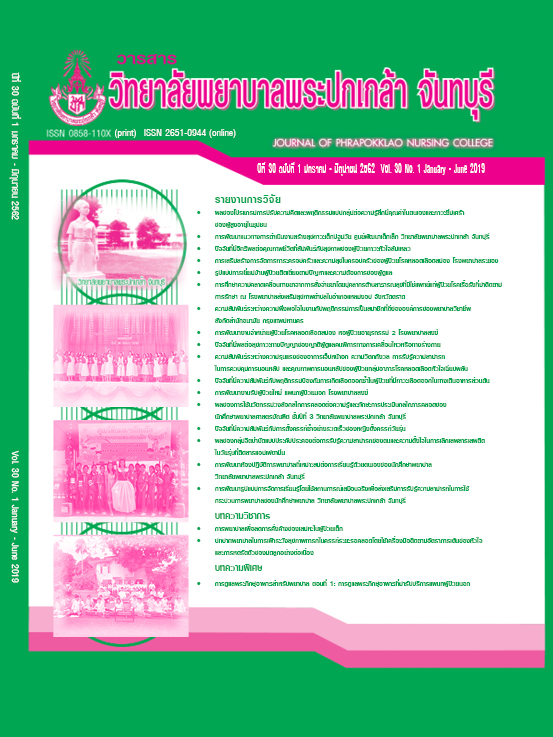The Enhancement of Family Burden Management and Family Happiness of Stroke Patients, Rayong Hospital
Keywords:
Family burden management, Family happiness, Assimilative integrate family counseling programAbstract
This quasi-experimental research aimed to study the enhancement of family burden management and family happiness of stroke patients. The participants consisted of 20 couples of stroke patients and their families receiving services at Rayong Hospitals and were equally divided into an experimental group (n = 10 couples) and a control group (n = 10 couples). The research instruments were composed of the assimilative integrate family counseling program, a recording form of general data, a questionnaire of family burden management with the reliability of .95, and the Thai Happiness Indicator [TMHI-15] with the reliability of .94. The implementation and data collection were conducted from May to September, 2017. Statistics used for data analysis included frequency, percentage, mean, standard deviation, two-way repeated measures MANOVA, and three-way repeated measures MANOVA with multiple comparisons by Bonferroni.
The research results revealed that 1) at post-test and follow-up period, the experimental group had statistically significant higher mean scores of family burden management and family happiness than the pre-test period and the control group (p < .05 and p < .001, respectively); and 2) at follow-up period, the experimental group had statistically significant higher mean scores of family burden management and family happiness than the post-test period (p < .05).
This research suggests that health care providers should appropriately apply the assimilative integrate family counseling program for counseling various families, especially the families with chronic disease patients in order to enhance family burden management and family happiness.
References
กรมสุขภาพจิต. (2559). แบบทดสอบดัชนีชี้วัดความสุขคนไทยฉบับสั้น The Happiness Indicator (TMHI-15). นนทบุรี: ผู้แต่ง.
ชูวิทย์ รัตนพลแสนย์. (2549). การให้คำปรึกษาครอบครัวเพื่อพัฒนาคุณภาพชีวิตสมรสของคู่สมรสทหารเรือ (ปริญญานิพนธ์ปริญญาดุษฎีบัณฑิต). กรุงเทพฯ: มหาวิทยาลัยศรีนครินทรวิโรฒ ประสานมิตร.
เพ็ญนภา กุลนภาดล. (2555). การปรึกษาครอบครัวตามแนวทฤษฎีเชื่อมโยงระหว่างรุ่น: จากทฤษฎีสู่การปฏิบัติ. วารสารศึกษาศาสตร์, 23(3), 57-66.
เพ็ญนภา กุลนภาดล. (2559). การปรึกษาครอบครัว Family counseling. ชลบุรี: เนติกุลการพิมพ์.
ยุพดี ทรัพย์เจริญ, และเพ็ญนภา กุลนภาดล. (2557). ผลการปรึกษาทฤษฎีเชื่อมโยงระหว่างรุ่นต่อความสามารถในการแยกตนเองของนิสิตปริญญาตรี. วารสารพยาบาลตำรวจ, 6(1), 12-29.
สำนักนโยบายและยุทธศาสตร์ กระทรวงสาธารณสุข. (2558). สถิติสาธารณสุข ปี 2558. กรุงเทพฯ: สำนักงานกิจการโรงพิมพ์องค์การสงเคราะห์ทหารผ่านศึก ในพระบรมราชูปถัมภ์.
Glade, A. C. (2005). Differentiation, marital satisfaction and depressive symptoms: An application of Bowen Theory (Doctoral dissertation). Columbus, OH: The Ohio State University.
Knerr, M. R. (2008). Differentiation and power in couple therapy (Doctoral dissertation). Columbus, OH: The Ohio State University.
World Stroke Organization. (2017). World Stroke Day 2017 What’s your reason for preventing stroke?. Retrieved from https://www.worldstrokecampaign.org/media/attachments/2017/07/20/english---world-stroke-day-2017-brochure-20170720.pdf
Zarit, S. H., & Zarit, J. M. (1990). The memory and behavior problems checklist and the burden interview. University Park, PA: Pennsylvania State University, Gerontology Center.
Zarit, S. H., Reever, K. E., & Bach-Peterson, J. (1980). Relatives of the impaired elderly: Correlates of feeling of burden. The Gerontologist, 20(6), 649-655.
Downloads
Published
How to Cite
Issue
Section
License
Copyright (c) 2019 JOURNAL OF PHRAPOKKLAO NURSING COLLEGE

This work is licensed under a Creative Commons Attribution-NonCommercial-NoDerivatives 4.0 International License.
เนื้อความ ข้อมูล และรายการอ้างอิงที่ผู้เขียนใช้ในการเขียนบทความเพื่อลงตีพิมพ์ในวารสารวิทยาลัยพยาบาลพระปกเกล้า จันทบุรี ถือเป็นความคิดเห็นและความรับผิดชอบของผู้เขียน คณะผู้จัดทำวารสารไม่จำเป็นต้องเห็นพ้องด้วยหรือร่วมรับผิดชอบ
บทความที่ได้รับการลงตีพิมพ์ในวารสารวิทยาลัยพยาบาลพระปกเกล้า จันทบุรี ถือเป็นลิขสิทธิ์ของวารสารวิทยาลัยพยาบาลพระปกเกล้า จันทบุรี หากหน่วยงานหรือบุคคลใดต้องการนำส่วนหนึ่งหรือทั้งหมดของบทความไปเผยแพร่ต่อเพื่อวัตถุประสงค์ใด ๆ จะต้องได้รับอนุญาตจากบรรณาธิการวารสารก่อน



